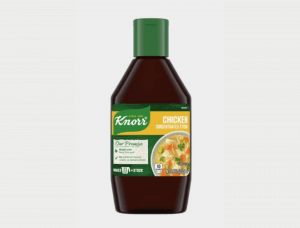What is the best Chicken Stock concentrate substitute?
Are you looking for a chicken stock concentrate substitute? Chicken stock concentrate adds depth and flavor to many dishes, but there are several alternatives you can use if you don’t have it on hand. Here are some of the best substitutes for chicken stock concentrate: Homemade chicken stock, Shop-bought chicken stock, Vegetable stock, Bouillon, Wine or beer, Soy sauce, Dashi, Mushroom broth, Aromatics & herbs, Cooking water from chicken.
Remember that the exact substitution will depend on the specific recipe you’re making and the desired flavor profile. It’s a good idea to taste and adjust as you go to ensure the final dish meets your expectations.
What is Chicken Stock Concentrate?
Chicken stock concentrate is a highly concentrated form of chicken stock that is used to add flavor and depth to various dishes. It is typically sold in small jars, tubes, or packets. It is a convenient way to incorporate the rich taste of chicken stock into recipes without the need for large quantities of liquid stock. Chicken stock concentrate is made by simmering chicken bones, vegetables, aromatics, and sometimes herbs in water for an extended period of time. This slow simmering process extracts the flavors, nutrients, and gelatin from the ingredients, resulting in a flavorful liquid.
Once the stock is prepared, it is further reduced to intensify its flavor. This concentrated liquid is then packaged as chicken stock concentrate. It has a thick consistency and a strong, savory taste that can enhance the flavor of soups, stews, sauces, gravies, and other dishes. Dilute with water to create chicken broth, or use directly to add a burst of chicken flavor to recipes. It can even be used as a substitute for fish-stock.
Chicken stock concentrate is a versatile ingredient in the kitchen, as a little goes a long way. It is quick and easy to use and is especially useful for those who want to add depth of flavor to their dishes but don’t have the time to prepare homemade chicken stock from scratch.
Okay, before we look at your chicken stock concentrate substitute options, let’s deal with that empty cupboard situation!
Where can I buy Chicken Stock Concentrate?
If you want to be more prepared and ensure you don’t run out of chicken stock concentrate then you should stock up now.
Nowadays most general supermarkets stock a chicken stock concentrate. Or if you prefer you can also purchase chicken stock concentrate on-line.
So why not jump on and place your order today.
STOCK UP NOW!
Delicious tasting chicken broth concentrate. Comes in a resealable squeezable bottle, which makes it so easy to store.
Gluten-free with no preservatives.
What can I substitute for Chicken Stock Concentrate?
Here are some of the best ingredients to substitute the flavor and role that chicken stock concentrate provides in your recipes.
- Homemade chicken stock
- Shop-bought chicken stock
- Vegetable stock
- Bouillon
- Wine or beer
- Soy sauce
- Dashi
- Mushroom broth
- Aromatics & herbs
- Cooking water from chicken
Chicken Stock Concentrate substitutes
Homemade Chicken Stock
Top of the lis is homemade chicken stock. Homemade chicken stock is generally more flavorful and has a more authentic taste compared to stock concentrates. Concentrates also tend to contain additives and artificial flavors.
When substituting homemade chicken stock for chicken stock concentrate, keep in mind the following:
- Chicken stock concentrate is more concentrated than homemade stock, so you might need to adjust the quantity. For example, if a recipe calls for 1 tablespoon of chicken stock concentrate, you might need to use 1 cup of homemade chicken stock.
- Homemade chicken stock tends to have a richer and more nuanced flavor. This can enhance the overall taste of your dish. Adjust seasoning as needed to maintain the balance of flavors.
- Chicken stock concentrates often contain salt, so you might need to adjust the salt level in your recipe when using homemade stock. Taste and add salt if necessary.
- Keep in mind that when substituting homemade chicken stock for concentrate, you’re adding more liquid to the recipe. You might need to adjust cooking times or consider reducing the liquid in other parts of the recipe.
- If you find that your dish becomes too watery after using homemade stock, you can simmer or boil the dish for a little longer. This will help to reduce the excess liquid.
In general, using homemade chicken stock can add a wonderful depth of flavor to your dishes.

Shop-bought Chicken Stock
A quicker option would be to use store-bought chicken stock as a substitute for chicken stock concentrate in recipes. Store-bought chicken stock is typically less concentrated than stock concentrate, so you’ll need to make some adjustments when substituting. Here’s what you should consider:
- Chicken stock concentrate is highly concentrated, so you’ll need to use more store-bought chicken stock to achieve the same level of flavor. For example, if a recipe calls for 1 tablespoon of chicken stock concentrate, you might need to use 1 cup of store-bought chicken stock.
- While store-bought chicken stock might not be as intense in flavor as concentrate, it still adds a good base flavor to your dishes. However, just remember it might not provide the same depth and richness that homemade stock or concentrate would.
- Just like chicken stock concentrate, store-bought chicken stock might contain salt. Adjust the salt level in your recipe accordingly, especially if you’re adding the stock to a dish that already has salt.
- As with using homemade stock, remember that using store-bought chicken stock will increase the liquid content of your dish. You might need to adjust cooking times or reduce the liquid in other parts of the recipe.
- If you find that the flavor of the dish isn’t as robust as you’d like, you can enhance the flavor by adding herbs, spices, or other seasonings that complement your recipe.
When substituting store-bought chicken stock for chicken stock concentrate, keep in mind that the exact results might vary based on the brand and quality of the store-bought stock. It’s a good idea to taste and adjust the dish as you go to ensure it meets your flavor expectations.
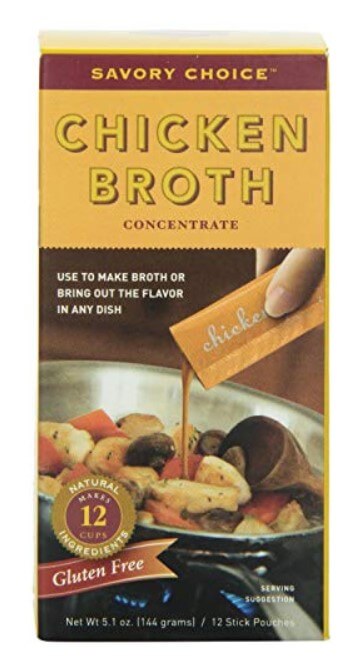
Vegetable stock
Use vegetable stock as a substitute for chicken stock concentrate in your recipes. This is also a good idea if you’re looking for a vegetarian or vegan option. However, there are some differences to consider:
- Chicken stock has a distinct savory and meaty flavor, which vegetable stock won’t exactly replicate. Vegetable stock is made from simmering vegetables and herbs, so it will have a more plant-based and earthy flavor. While it won’t mimic the exact taste of chicken, it can still add depth and richness to your dishes.
- Chicken stock concentrate often contains salt, so if you’re using vegetable stock, you might need to adjust the seasoning in your recipe. Taste as you go and add salt if needed to achieve the desired flavor.
- While vegetable stock can be used in a wide range of dishes, consider how its flavor will interact with the other ingredients. It might work well in recipes where the chicken flavor is not a central element.
- Some recipes might require a longer cooking time to allow the vegetable stock to infuse its flavors thoroughly. Make sure to taste and adjust the seasoning as the dish cooks.
- To enhance the flavor profile, you might want to add extra herbs, spices, or umami-rich ingredients (like soy sauce or miso) to your dish when using vegetable stock.
- Keep in mind that vegetable stock might have a different texture and mouthfeel compared to chicken stock concentrate. This might not be a significant issue, but it’s something to be aware of.
In dishes where the chicken flavor is not the primary focus, vegetable stock can be a suitable substitute. However, if the recipe’s success relies heavily on the taste of chicken stock, consider the impact that using vegetable stock might have on the overall flavor.
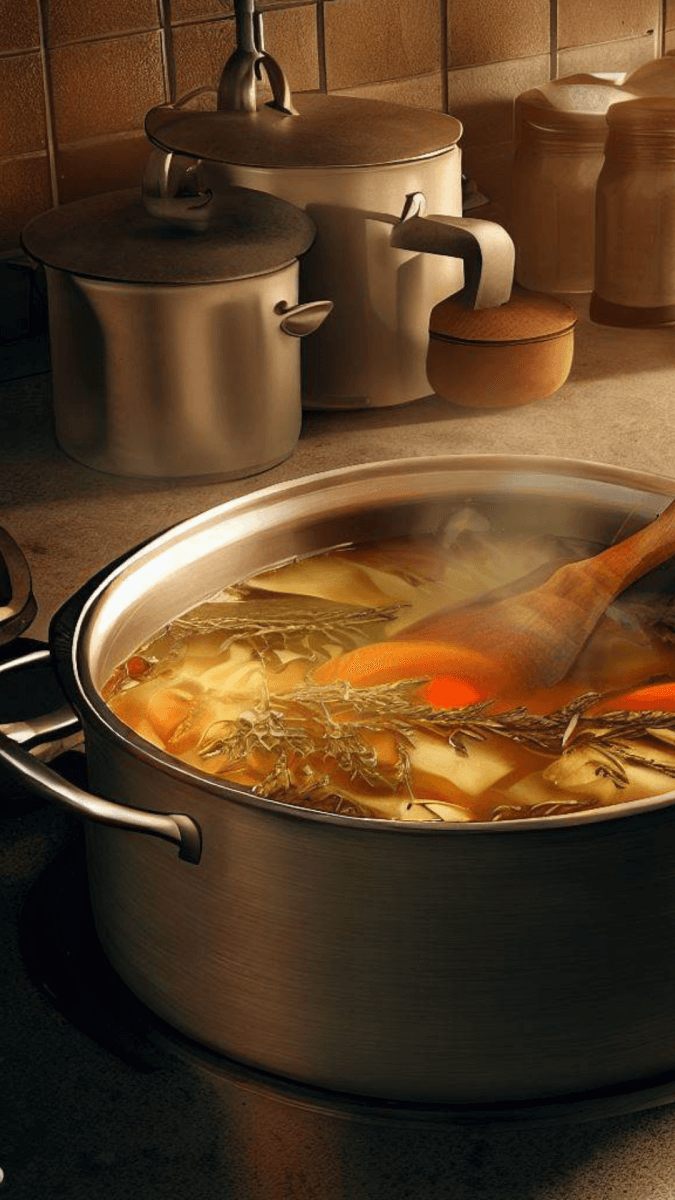
Bouillon
You can use bouillon as a substitute for chicken stock concentrate in recipes. Bouillon is a concentrated seasoning made from dehydrated vegetables, meat, and other flavorings. It is commonly used to make broth or stock by adding it to hot water. When using bouillon as a substitute for chicken stock concentrate, consider the following:
- Bouillon is highly concentrated, so you’ll need to dilute it with water to create a broth similar to chicken stock. Follow the package instructions to determine the appropriate ratio of bouillon to water. Generally, 1 teaspoon of bouillon might be dissolved in 1 cup of hot water to create a broth.
- Remember bouillon can be quite intense in flavor, so you might want to use less bouillon in the recipe. Start with a smaller amount, taste, and adjust as needed.
- Most bouillon cubes or granules contain salt, so consider the overall salt content of your dish and adjust the seasoning accordingly. You may need to reduce or omit additional salt in the recipe.
- Depending on the specific bouillon you’re using, it might contain various herbs, spices, and flavorings. These can contribute to the overall flavor of your dish, so you will need to think of how these flavors will interact with the other ingredients in your recipe.
- Bouillon can sometimes leave a gritty or slightly textured residue when dissolved in water. Make sure to dissolve it thoroughly to avoid any unwanted textures in your dish.
- Bouillon can work well as a substitute in recipes that involve simmering or boiling, such as soups, stews, and sauces. However, keep in mind that the final flavor profile might differ slightly from using chicken stock concentrate.
As with any substitution, it’s a good idea to taste as you go and adjust the flavors to match your preferences. Bouillon can be a convenient option when you don’t have chicken stock concentrate on hand. However, be prepared for some variation in taste and texture compared to using stock concentrate.
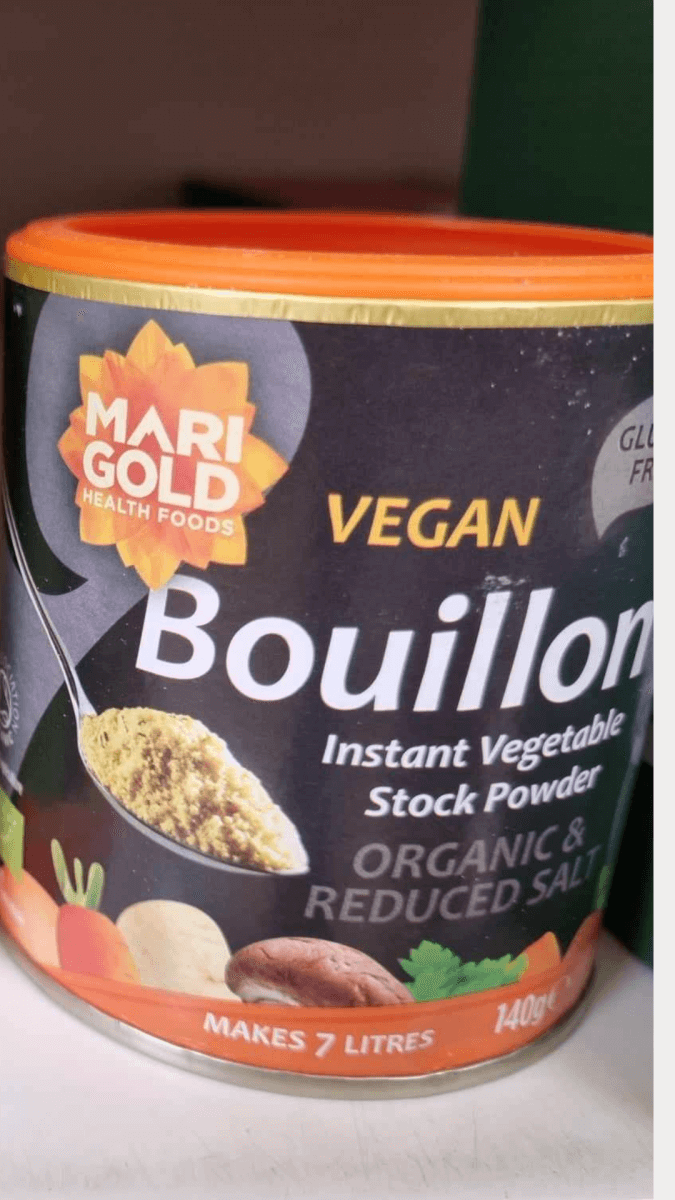
Wine or beer
Wine or beer can be used as a flavor enhancer in recipes and can add depth to dishes, but they may not be direct substitutes for chicken stock concentrate. Here’s what to consider if you’re thinking about using wine or beer as a substitute:
- Wine and beer have distinctive flavors that can complement certain dishes, but they won’t replicate the savory and umami-rich qualities of chicken stock concentrate. Wine can add acidity and complexity, while beer can provide a slightly bitter and hoppy flavor.
- Both wine and beer contain alcohol, which will cook off to some extent during the cooking process, but not entirely. If you’re concerned about alcohol content (for instance, if you’re cooking for children or individuals who avoid alcohol), this is something to keep in mind.
- Wine and beer are often used in recipes that call for deglazing, braising, or simmering. They can work well in certain dishes, like stews, sauces, and some soups, where their flavors complement the overall taste of the dish.
- If you decide to use wine or beer as a substitute for chicken stock concentrate, you’ll need to adjust the quantity based on the recipe and your taste preferences. Start with a smaller amount and taste as you go. Keep in mind that the final result will be different from using chicken stock concentrate.
- Wine and beer can contribute to the seasoning of your dish, so you may need to adjust other seasonings accordingly. Consider the overall balance of flavors in the recipe.
- Wine can add acidity, which might not be suitable for all dishes. Make sure that the acidity from the wine doesn’t overpower the other flavors in the dish.
While wine or beer can add complexity and flavor to your dishes, they won’t provide the same liquid base that chicken stock concentrate does. If you’re looking for a liquid base, you might want to consider using a combination of wine or beer along with water or vegetable broth to create a flavorful cooking liquid. Ultimately, experimentation and taste-testing will help you determine if wine or beer will work well in your specific recipe as a substitute for chicken stock concentrate.

Soy sauce
Use soy sauce as a flavor enhancer to add a savory and umami-rich quality to dishes. However, it might not be a direct substitute for chicken stock concentrate due to some differences in flavor and texture. Here’s what you should consider:
- Soy sauce is known for its salty and umami flavor. While it can add depth to your dishes, it won’t replicate the well-rounded flavor profile of chicken stock concentrate. It works well in recipes where a strong umami taste is desired.
- Soy sauce is quite salty, so if you’re using it as a substitute, you’ll need to be careful of the overall salt content of your dish. You might need to reduce or adjust the amount of added salt in your recipe.
- Chicken stock concentrate provides both flavor and liquid to a recipe. Soy sauce doesn’t have the same liquid content, so if your recipe requires a certain amount of liquid, you’ll need to make up for it with water or another liquid.
- If you plan to use soy sauce as a substitute for chicken stock concentrate, you’ll need to dilute it with water. The ratio will depend on the strength (light/dark) of the soy sauce and the desired intensity of flavor. Start with a small amount and adjust to taste.
- Soy sauce can work well in recipes that call for a deep, savory flavor, such as stir-fries, marinades, glazes, and certain sauces. It might not be suitable for all types of dishes, especially those that require a more balanced or subtle flavor.
- If you’re looking to boost the umami flavor in your dish, soy sauce can be a great addition. You might also consider other umami-rich ingredients like miso paste or nutritional yeast.
While soy sauce can’t replicate the full qualities of chicken stock concentrate, it can certainly contribute a unique flavor element to your dishes. Experimentation and taste-testing are key when using soy sauce as a substitute to ensure that the overall flavor of your dish remains harmonious.
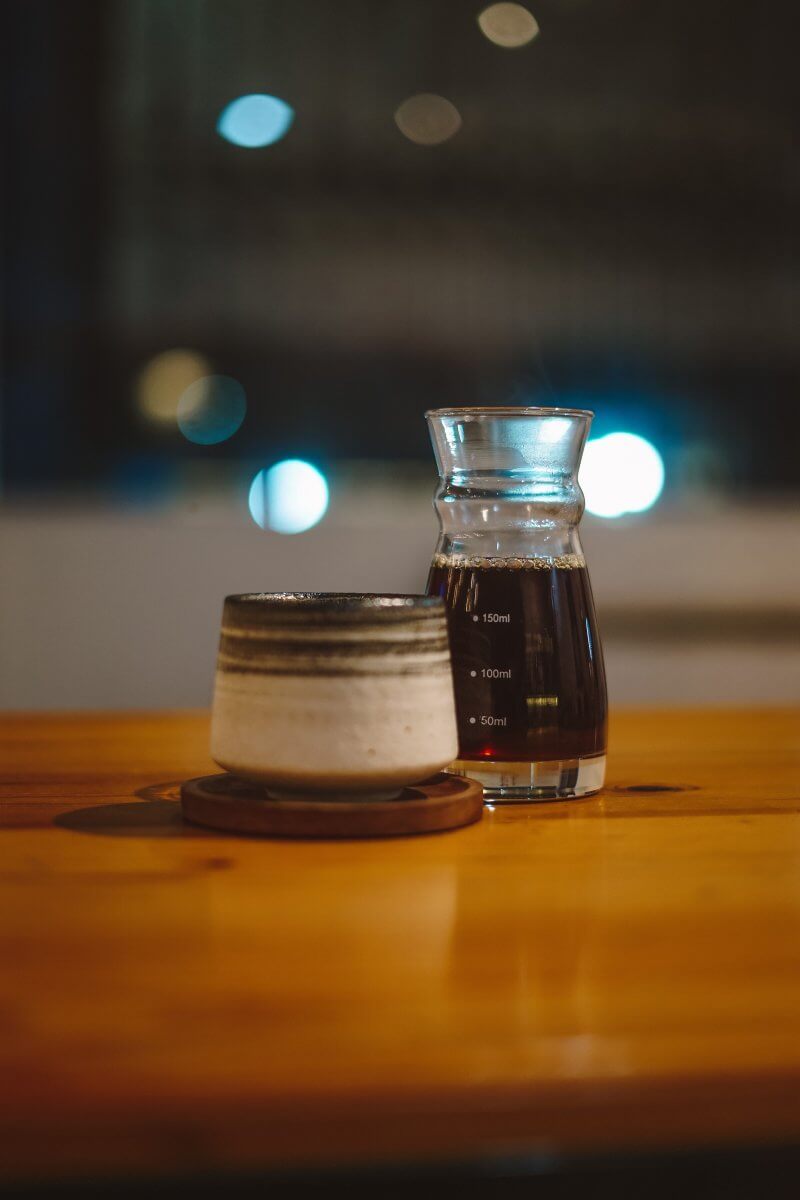
Dashi
Dashi can be used as a substitute for chicken stock concentrate in recipes, especially in dishes that have an Asian or Japanese flavor profile. It is a traditional Japanese broth made from kombu (seaweed) and bonito flakes (dried fish flakes), and it provides a unique umami-rich taste. Here’s what you should consider:
- Dashi has a distinct umami flavor that is different from chicken stock concentrate. It’s often used as a base for Japanese dishes and can add a depth of flavor that’s similar to chicken stock concentrate but with its own character.
- Dashi is particularly known for its umami-enhancing qualities, which can work well in dishes that benefit from a savory, rich taste.
- Depending on how the dashi is made, it might have a slightly salty or briny taste due to the kombu and bonito. Be careful of the overall salt content in your recipe when using dashi as a substitute.
- Dashi provides both flavor and liquid to your dish, which is similar to chicken stock concentrate. However, the flavors will be different, so consider how the substitution will impact the final taste of your recipe.
- Dashi is a traditional ingredient in Japanese cuisine and works well in dishes like miso soup, ramen, and various stews. It might not be a suitable substitute in dishes where the dashi flavor clashes with the other ingredients.
- Using dashi as a substitute might be more appropriate in dishes that align with Japanese or Asian flavors. It might not work as well in dishes that have a different culinary background.
- When substituting dashi for chicken stock concentrate, you might need to adjust other seasonings in your recipe to ensure the flavors are balanced.
As with any substitution, it’s important to consider the overall flavor profile of your dish and how the substitution will impact the final result. Dashi can add a unique and delicious twist to your recipes, especially those with Asian influences.
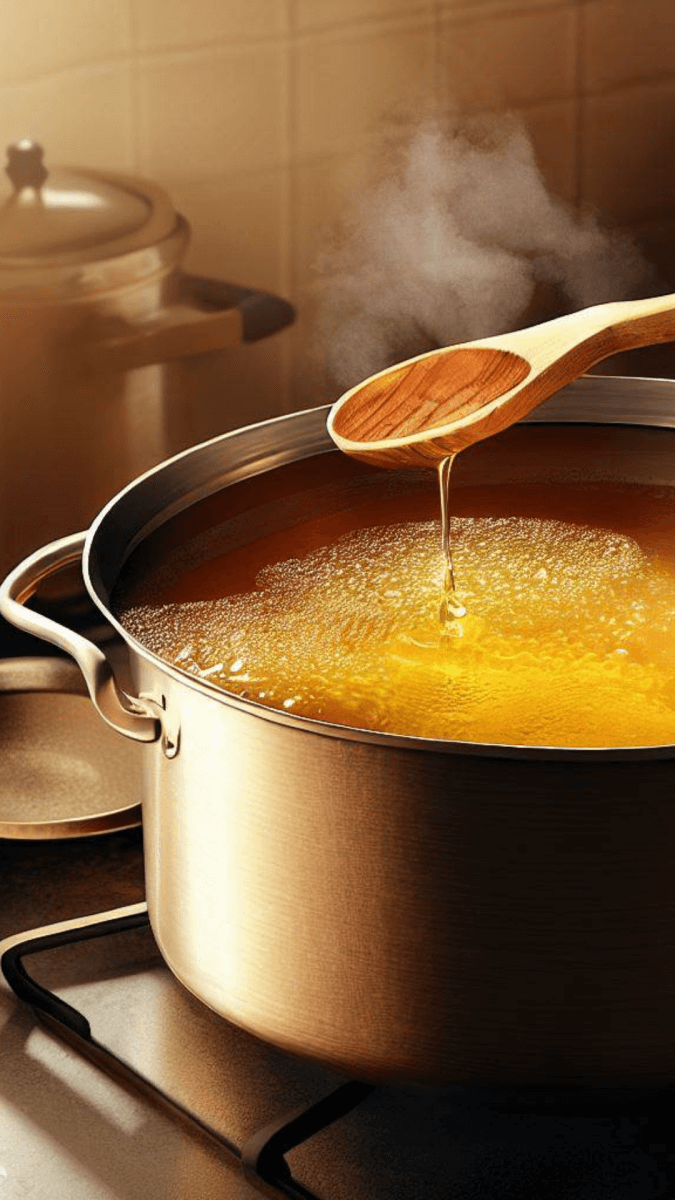
Mushroom Broth
Mushroom broth can be a suitable substitute for chicken stock concentrate, especially if you’re looking for a vegetarian or vegan option. The broth offers a rich and earthy flavor that can enhance various dishes. Here’s what you should consider:
- Mushroom broth has a deep umami-rich flavor that can work well in a variety of recipes. It might not replicate the exact taste of chicken stock concentrate, but it can add a unique and satisfying taste to your dishes.
- Mushrooms are naturally high in umami, which is the savory and meaty taste often associated with broths and stocks. This can contribute to the overall flavor complexity of your dishes.
- Mushroom broth can work well in dishes where its earthy flavor complements the other ingredients. It’s particularly great in soups, stews, sauces, risottos, and other comfort foods.
- Just like chicken stock concentrate, mushroom broth provides both flavor and liquid to your dishes. Remember that the final taste might vary due to the difference in flavors between mushrooms and chicken.
- Different mushroom broths might have varying levels of salt, so you will need to adjust the overall salt content of your recipe as needed.
- Mushroom broth might have a different texture and mouthfeel compared to chicken stock concentrate. However, this might not be a significant concern for most recipes.
- Depending on the specific flavor profile of the mushroom broth, you might need to adjust other seasonings to ensure a balanced taste.
Using mushroom broth as a substitute for chicken stock concentrate can offer a delicious and unique twist to your dishes. It will also provide a delicious umami flavor. Experiment with different recipes and taste as you go to determine the right balance of flavors for your palate.
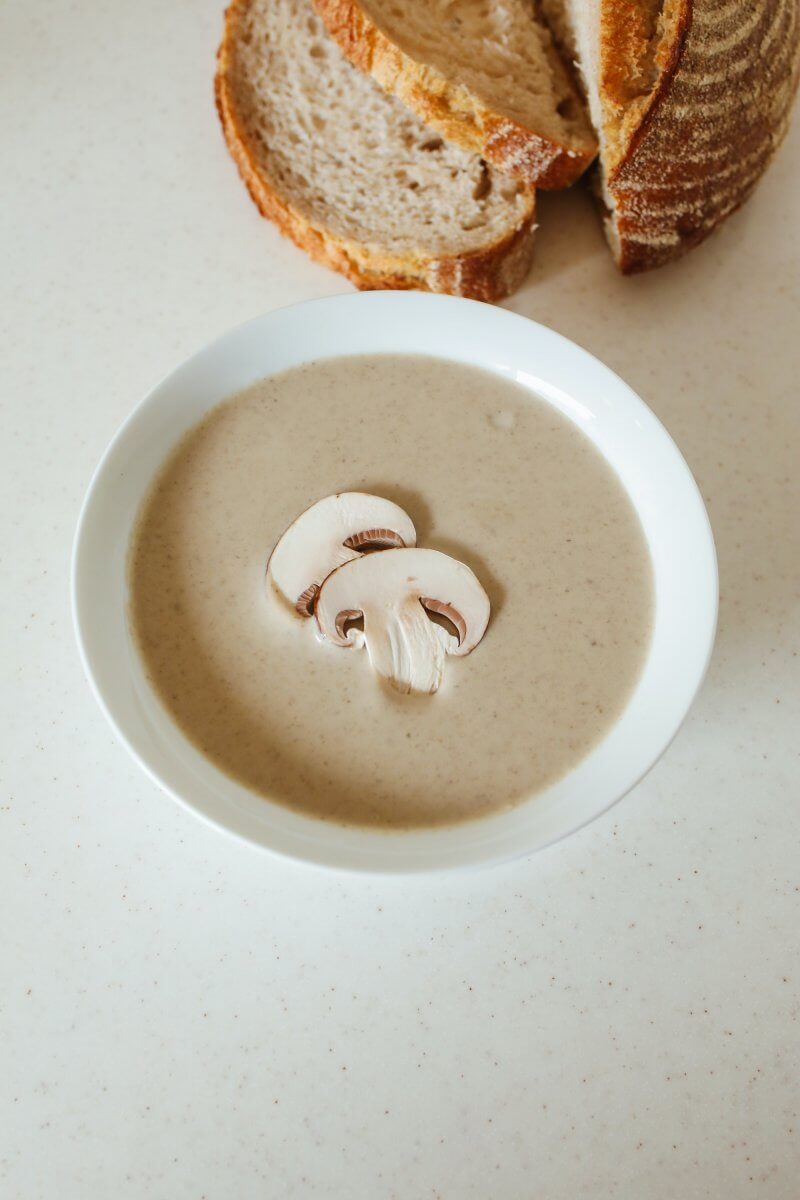
Aromatics & Herbs
Use aromatics and herbs to create a flavorful liquid base in recipes, but they will not directly replace the concentrated flavor and liquid that chicken stock concentrate provides. However, you can still use aromatics and herbs to enhance the taste of your dishes in a unique way. Here’s how you can approach it:
- You can create a simple broth or infusion by simmering aromatics and herbs in water. This will infuse the water with their flavors, creating a base that can add depth to your dish.
- Experiment with different combinations of aromatics and herbs to create a flavor profile that complements your dish. Common aromatics include onions, garlic, carrots, celery, leeks, and shallots. Popular herbs might include thyme, rosemary, bay leaves, parsley, and sage.
- Simmer the aromatics and herbs in water to extract their flavors. The longer you simmer, the more flavorful the resulting liquid will be.
- After simmering, strain the liquid to remove the solids (aromatics and herbs) and retain the flavorful broth.
- Add salt and other seasonings to taste. Keep in mind that chicken stock concentrate often contains salt, so adjust the salt level in your recipe accordingly.
- Aromatics and herb-infused broth can work well in a variety of recipes, such as soups, sauces, stews, and risottos. They might not provide the exact flavor profile of chicken stock concentrate, but they can still elevate your dishes.
- The great thing about creating your own aromatic and herb-infused broth is that you can tailor it to match the specific flavors you want to highlight in your dish.
While aromatics and herbs can add a wonderful layer of flavor to your dishes, keep in mind that they won’t replicate the exact taste and texture of chicken stock concentrate. However, they can be a valuable tool in your culinary repertoire, offering a fresh and personalized way to enhance the flavors of your recipes.

Cooking water from chicken
When you cook chicken, the resulting cooking water can contain flavors from the meat, herbs, and seasonings you used, making it a suitable liquid base for enhancing the taste of your dishes. Here are some considerations:
- The cooking water from chicken will have a chickeny flavor infused with any herbs, spices, and seasonings you used during cooking. It might not be as concentrated as stock concentrate, but it can still add depth to your dishes.
- Depending on how you seasoned the chicken and its cooking water, the liquid might already contain salt and other flavors. Taste it before using it in your recipe to gauge its intensity.
- Cooking water from chicken is typically less concentrated than stock concentrate, so you might need to use a larger quantity to achieve the desired flavor in your recipe.
- Since you control the seasoning when cooking the chicken, you have the flexibility to tailor the cooking water to match the flavors you want in your dish.
- Cooking water from chicken can work well in recipes that call for chicken stock concentrate. This includes recipes such as soups, stews, sauces, and rice dishes.
- Depending on how you cooked the chicken, you might need to strain the cooking water. This will remove any impurities or solids before using it in your recipe.
Using the cooking water from chicken is a resourceful way to add flavor to your dishes while reducing waste. It might not have the same concentrated flavor as stock concentrate, but it can still contribute a delicious taste to your recipes. Taste as you go and adjust the seasoning if needed to achieve the desired balance of flavors.

Summary for Chicken Stock Concentrate substitutes
Okay – that’s you all sorted with suitable substitutes for chicken stock.
When it comes to substituting chicken stock concentrate in your recipes, there are several options available to you. Each substitute has its own unique flavor profile and characteristics, so the choice will depend on your recipe and preferences:
- Homemade Chicken Stock: Offers rich, authentic flavors and can be a direct replacement in most recipes. Adjust quantities based on concentration.
- Store-Bought Chicken Stock: Use as a quick and easy substitute, but it might require adjustments in quantity and seasoning.
- Vegetable Stock: A vegetarian option that works well in recipes where chicken flavor isn’t essential.
- Bouillon: A concentrated seasoning that can enhance flavor but might require dilution and seasoning adjustments.
- Wine or Beer: Adds depth to recipes but won’t replicate the same liquid base or flavor profile.
- Soy Sauce: Adds umami and depth but won’t provide the liquid content of stock concentrate.
- Dashi: Works well in Asian-inspired dishes, providing a unique umami-rich flavor.
- Mushroom Broth: Offers a vegetarian option with a rich and earthy flavor.
- Aromatics and Herbs: Create flavorful infusions, enhancing dishes with unique tastes.
- Chicken Cooking Water: A resourceful option that adds chickeny flavors but might require dilution and seasoning adjustments.
Remember that experimentation and taste-testing are key when substituting ingredients. Choose the substitute that aligns best with your recipe and desired flavor outcome. Don’t be afraid to get creative in the kitchen and tailor the substitutions to your preferences.
We have gathered together a lot more facts on ingredients such as herbs, spices, oils, nuts, etc. if you would like to learn some more.
